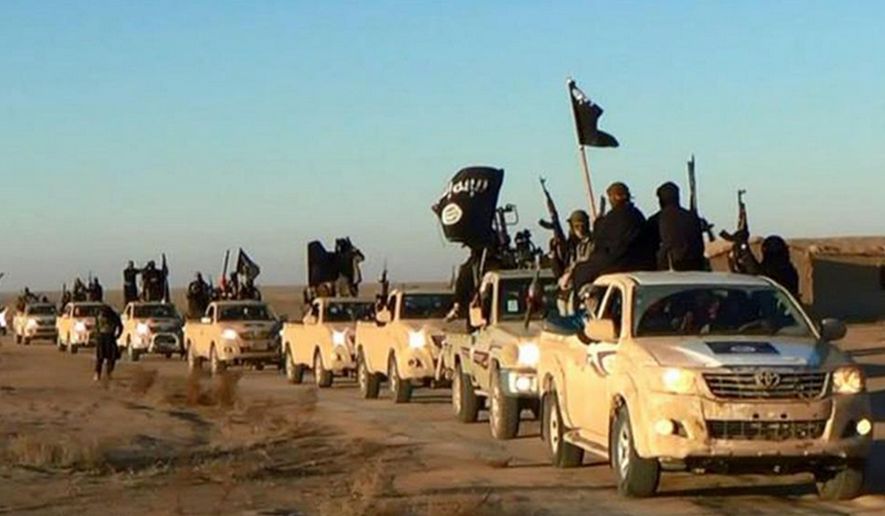Top American and European military leaders are weighing options to step up the fight against the Islamic State in the Mideast, including possibly sending more U.S. forces into Iraq, Syria and Libya, just as Washington confirmed the second American combat casualty in Iraq in as many months.
Secretary of Defense Ashton Carter and Chairman of the Joint Chiefs of Staff Gen. Joseph Dunford met with several of their European counterparts on Tuesday in Germany to discuss the campaign against Islamic State, also know as ISIS or ISIL, which has spread through Iraq, Syria and elsewhere in the Middle East.
“We are always looking to build momentum in this,” Mr. Carter told reporters shortly before the meeting at U.S. European Command in Stuttgart. “As the campaign progresses [in Iraq] and in Syria, and more opportunities are presented to make different kinds of contributions, we’re going to do that.”
Mr. Carter and Gen. Dunford did not detail how many more U.S. troops could be heading to the region or when those deployments could take place, but the cost of a potential U.S. military escalation became abundantly clear Tuesday when the Pentagon confirmed the latest American casualty in Iraq.
A U.S. Navy SEAL working with Kurdish peshmerga forces outside Islamic State-held Mosul, Iraq’s second largest city, was killed during a fierce firefight with the militants. “It is a combat death,” Mr. Carter told reporters in Stuttgart.
Islamic State fighters unleashed a wave of car bombs, suicide bombers and gunmen on Kurdish front lines to the north of Mosul, successfully overrunning Kurd fighting positions until a barrage of American airstrikes halted the Islamic State advance, Reuters reported Tuesday.
The U.S. service member was “advising and assisting peshmerga forces” just three miles behind the Kurdish front line when he was killed helping repel the Islamic State onslaught, Pentagon spokesman Peter Cook said in a statement.
Peshmerga commanders told Reuters the assault was the biggest those forces have seen in several months.
The Pentagon has not released the name and unit of the American casualty, but unnamed U.S. defense officials reportedly confirmed the slain service member was a Navy SEAL.
Despite President Obama’s decision to withdraw all combat troops by 2011, roughly 3,500 to 5,000 U.S. military advisers and special operations forces are back in Iraq and Syria, fighting the rising challenge from the Islamic State. Mr. Obama in April ordered 200 U.S. troops into Iraq in April to back the Iraqi-led offensive to take back Mosul.
U.S. military officials have estimated the fight for Mosul could require as many as 25,000 Iraqi troops.
While U.S. focus remains fixed on Mosul and Islamic State’s Syrian stronghold in Raqqa, the terror group’s growing presence in Libya is forcing Washington to consider a bigger deployment there, Mr. Carter said Tuesday.
The Islamic State has filled a power vacuum in Libya, caused by infighting among the country’s numerous militias after the fall of Moammar Gadhafi in 2011.
An updated United Nations report in March put the number of Islamic State fighters in Libya at nearly 6,000, Reuters reported.
For the first time in February, the Italian government gave the Pentagon the green light to begin armed drone strikes against Islamic State targets in Libya and elsewhere in northern Africa from U.S. and NATO bases in southern Italy. A U.S. airstrike in the eastern city of Derna in November reportedly killed Abu Nabil, the group’s top commander in Libya.
“If there is a threat against the homeland or U.S. personnel, we’re going to act, and … we’ve passed the threshold for that,” Gen. Dunford said.
U.S. Africa Command chief Gen. David Rodriguez has met with members of Libya’s Government of National Accord, the country’s governing body officially recognized by the U.S. and United Nations, Gen. Dunford said Tuesday.
“They want assistance … [and] you know that a number of countries, including the United States … are prepared to do that,” the four-star general added.
Neither Mr. Carter nor Gen. Dunford said how soon U.S. and European military assistance operations could begin in earnest in Libya.
“I don’t want to put a timeline on it. I think it’s going to be up to [the Libyans]. But I think that the signs are very positive there,” Mr. Carter said.
• Carlo Muñoz can be reached at cmunoz@washingtontimes.com.




Please read our comment policy before commenting.